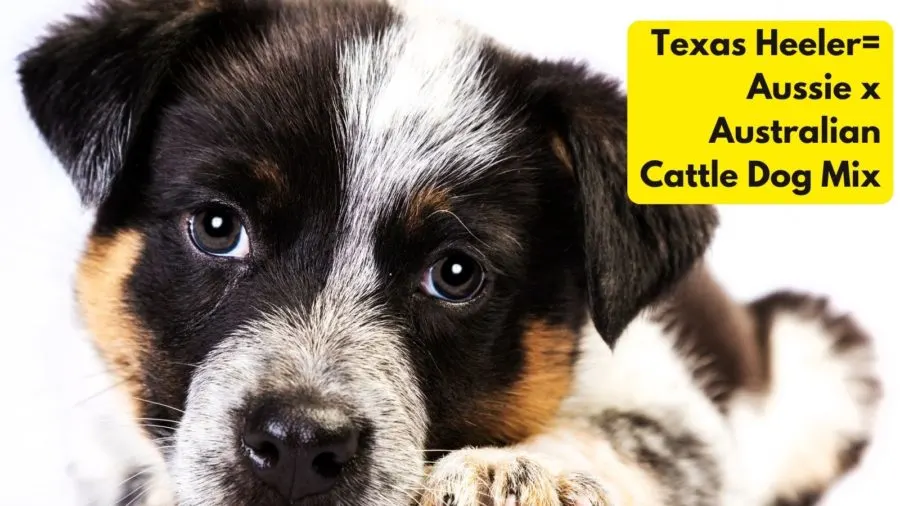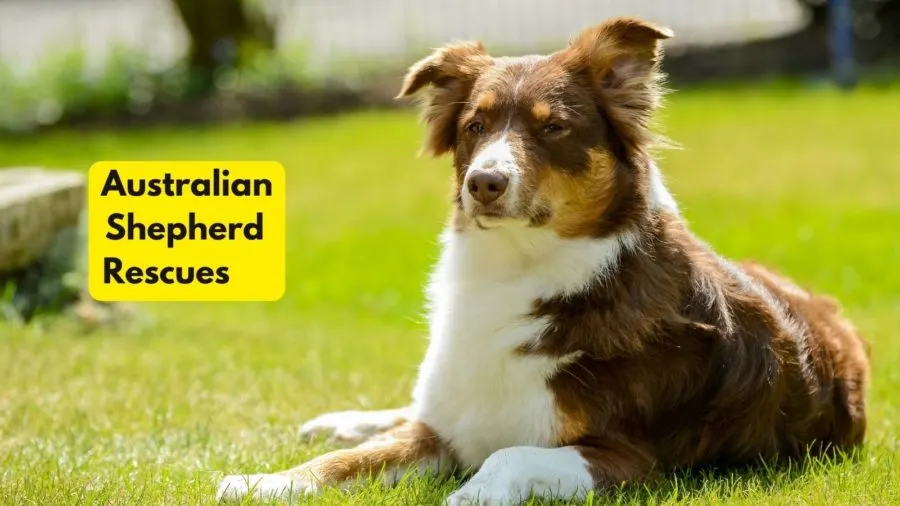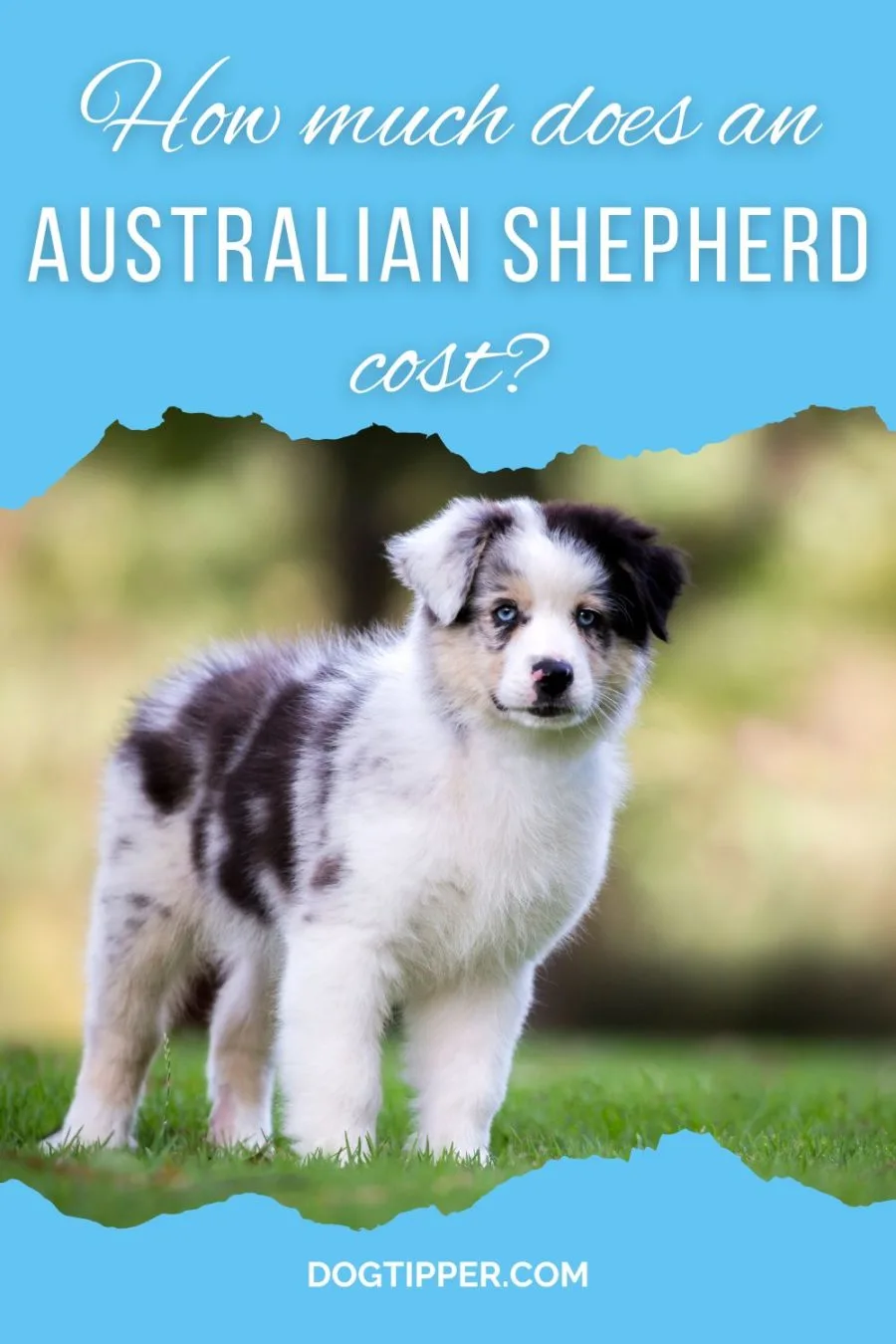The Australian Shepherd is a popular dog breed known for its loyalty and intelligence. They are also a versatile breed as a family dog, agility dog and even a ranch herding dog. If you’re thinking about adding an Aussie to your family, you’ll find the Australian Shepherd price varies greatly, from shelters and rescues to breeders.
Let’s take a look at the many options you have for adding an Aussie–or an Aussie mix–to your home and heart.

How Much Does an Australian Shepherd Cost from a Breeder?
An Australian Shepherd puppy price can range anywhere from $700-$3,000. There are many factors that can affect the price, ranging from the breeder’s reputation to even the dog’s coat color.
In general, male Aussies are usually more expensive than female dogs, and some coat colors (like blue merle) are more expensive than others.
The price will depend on several factors:
- The location of the breeder. The rules of supply and demand pertain to dogs as well so larger metropolitan areas are often more expensive.
- The pedigree of the parents. Aussies that have participated in sanctioned competitions have more expensive litters.
- Whether the Aussie is a show quality dog, a working dog line or a pet quality dog. Most breeders will require that pet quality dogs be spayed/neutered at the appropriate age. Show quality puppies with a future in competitive dog shows and breeding are more expensive. Aussies from a working line are bred with an eye on behavior, not for the same looks as a show dog. (In fact, the darker colors that are less popular in Aussie show dog lines are more popular in working dog lines to reduce the risk of sunburn.)
- The age of the dog. Puppies are definitely more expensive; you may occasionally find a breeder selling a retired breeding Australian Shepherd that originated at the breeder but has been returned.
- The color of the Aussie. AKC recognized four colors: black, blue merle, red and red merle. The Canadian Kennel Club, the Federation Cynologique Internationale and the Kennel Club of the UK recognize the same colors. The blue merle is typically the most expensive color from breeders.
When you purchase an Australian Shepherd from a breeder, the price usually includes the dog’s registration papers and shots. Some breeders will also include a health guarantee. Be sure to ask about what’s included in the price before you make your purchase. See the Health Tests section below to know which tests are important for breeders to perform.
When adopting from a breeder, it’s especially important to make sure you are adopting from a reputable breeder—not a backyard breeder and not an online seller. Below we’ll look at how you can be sure you are talking with a responsible Australian Shepherd breeder.
Related Post: Unique Australian Shepherd Names for Your One-of-a-Kind Fur Baby!
What’s the Price of an Australian Shepherd Mix?
In general, a purposeful Australian Shepherd mix or crossbreed is lower priced than a purebred Australian Shepherd–but that can vary with the mix. And there are a LOT of purposeful mixes.
With the intelligence and good looks of the Australian Shepherd, it’s no surprise that the breed has been used for many purposeful crossbreeds.
The Aussiedoodle, one of the many Doodle crosses that include a Poodle parent, is a popular mix–and can cost more than a purebred Aussie. Aussiedoodle puppies can be priced anywhere from $500 to $5000.
The Aussiedor (also called a Sheprador), an Aussie and Labrador Retriever mix, is generally lower priced; puppies range from $350-800.

Here in Texas, the Texas Heeler, an Aussie and Blue Heeler (Australian Cattle Dog) mix is popular. Prices for Texas Heeler puppies range from about $400-$800.
Health Tests for Aussies
Like all breeds, Australian Shepherds are susceptible to several orthopedic and hereditary diseases—so reputable breeders will conduct testing on both parents to help ensure a healthy litter. The United States Australian Shepherd Association recommends these tests as mandatory for Aussies:
- The Orthopedic Foundation for Animals (OFA) evaluations for Hip Dysplasia and Elbow Dysplasia.
- Annual OFA Eye Certification exams (previously called CERF exams) by a Board Certified Canine Ophthalmologist; the exam should be is registered with OFA.
And these tests are highly recommended:
- Hereditary Cataracts (HSF4). A mutation in the HSF4 gene can cause cataracts in some breeds, including Aussies.
- Multi Drug Sensitivity (MDR1). Multi Drug Sensitivity is a mutation of the MDR1 gene. This mutation permits drugs to impact the brain and can cause neurological problems and even death. Ivermectin–the drug in many heartworm preventatives–is just one drug that cannot be given to dogs with this condition. Approximately 50% of Australian Shepherds have Multi Drug Sensitivity so it’s important to have this test performed–either by the breeder or on your own.
- Collie Eye Anomoly (CEA). Sometimes called collie eye defect, this genetic condition doesn’t just impact collies but also Australian Shepherds and some other breeds.
If you adopt a rescue Aussie, you most likely won’t have the benefit of these tests–but you can run the Embark Dog DNA Test using a simple saliva test you can perform at home. It tests for over 215 genetic diseases and conditions–including the MDR1 genetic mutation to help you select heartworm preventative. (Embark can also test to see if your new dog is an Aussie or combination of the 350+ breeds in its database.)
How to Find a Reputable Australian Shepherd Breeder
- Check the Breeder Directory at the United States Australian Shepherd Association.
- Attend a sanctioned dog show and talk with breeders and competitors for recommendations.
- Ask your veterinarian for recommendations regarding reputable breeders.
Once you’ve found a few names, do an online search to learn more and narrow your list.
Search for “BREEDER NAME complaints” or “BREEDER NAME scam” to see if you find complaints. Are there any Better Business Bureau (BBB) complaints? Check the Facebook page of the breeder and read through the comments. (Remember, however, that comments can be deleted by the page owner.)
Once you’ve narrowed your choice, it’s time to talk to the breeder:
- Ask for references. The breeder should be happy to share the name and contact information for customers.
- Ask questions. Lots of questions. The breeder should be happy to answer questions about the puppy, the puppy’s parents (and grandparents!), the socialization the puppy has received, the health tests and screening he has received and more. The breeder should be glad to share the test results from the health tests and screenings and should be happy to let you meet at least the mother (if not the sire as well) of the Aussie puppies.
- Ask how often the dogs are bred. A breeder shouldn’t have Australian Shepherd puppies for sale at all times; reputable breeders will selectively breed and only have puppies for sale occasionally.
- Ask to tour the kennels. Are they well maintained? Do the dogs look healthy? Beware of operations that will not let you tour the kennels and breeders that want to meet you in a parking lot to hand over the puppy.
- Be prepared for questions. The breeder should ask YOU questions as well; be suspicious if the breeder has no questions about your past history with pets, your living situation, etc. The breeder should want to know how much experience you have with herding breeds, what your training plans are and your plans for exercising the dog. (Aussies require a lot of exercise!)
- Ask if the breeder will take the Aussie back if necessary. Reputable breeders should not only agree to accept the dog if it doesn’t work out or even upon your death—but require that the dog be returned to them for rehoming.
- Ask for a contract. VCA Animal Hospital recommends that the breeder “Provides a written contract with a guarantee of health allowing time for a pre-purchase examination by a veterinarian of your choice. If medical problems are diagnosed, the breeder should readily take the pup back and provide a full refund.”
- Ask for registration papers in your name.
Australian Shepherd breeders may adopt out of the area but, nonetheless, you will want to go to the breeder to meet the parents, view the kennels and bring home your puppy in person. This will add to your expenses—but breeders that transport a puppy by air are putting the dog at risk.
If you want to buy an Australian Shepherd online, please think again. There are numerous scams; people spend thousands of dollars for a dog and never receive a puppy. AKC warns potential pet parents to be wary of any seller asking for payment by Venmo, in gift cards or as a wire transfer.
Sadly many dogs sold online and in pet shops are often the result of puppy mills, places where dogs live 24/7 in terrible conditions without human socialization and often with serious health issues. Dogs purchased from puppy mills can mean years of heartache and expensive veterinary care–and perpetuating a cruel industry.
The pros of purchasing from an Australian Shepherd breeder:
- You may be able to select a puppy—including a choice of color and gender.
- You may obtain health screenings for the puppy’s parents.
- A reputable breeder will be passionate about Aussies and will a resource for years to come.
The cons of purchasing from a Aussie breeder
- You will pay far more for a Aussie from a breeder than a rescue or shelter. If you find a breeder who has Australian Shepherd puppies for sale at prices much lower than you are seeing from other Aussie breeders, you must suspect you are dealing with a backyard breeder who has not done health screening, with an online seller who is operating a puppy mill or with someone who is running a scam. Beware.
- You will need to wait until puppies are available.
- You will need to do your own due diligence to select a reputable breeder.
What’s the Price of Adopting an Australian Shepherd at a Breed Rescue?

Australian Shepherds in rescues are far less expensive that those at a breeder. Generally the price of an Aussie at an Australian Shepherd rescue will range from $150-$500, depending on the location and the age of the dog. Puppies under a year old will be the most costly.
You’ll find both purebred Aussies, Aussie mixes and probable Aussies at breed rescues. Because Aussies are such a popular breed, there are many Aussie rescues.
Also check with other herding breed rescues–we’ve seen Aussies for adoption at Border Collie rescues and Australian Cattle Dog rescues as well.
The Aussies available in rescues will have received a long list of valuable services:
- Spay/neuter, in most cases
- Age appropriate shots
- Heartworm screening and monthly preventative
- De-worming
- Wellness visit
- Any veterinary care the dog may have required while waiting for adoption
The cost of these services, depending on your vet and the gender of your dog, could range from $300-500 if you went to purchase the same services.
Most breed rescues operate through a foster system of devoted Australian Shepherd lovers; because of the time spent in a home, the foster will be able to tell you about the dog’s personality, likes and dislikes–and what type of home this dog would do best in.
Breed rescues generally have more stringent adoption processes to ensure a good fit both for you and the Aussie.
For example, Lone Star Aussie Rescue only adopts to families without children under age 5 in the home because of the energetic nature and herding instinct of the breed. Many rescues will require a home visit as well.
The dogs that are up for adoption at Aussie rescues may be there for a variety of reasons:
- Death of an owner.
- Change in owner’s living situation. Maybe they moved out of pet-friendly housing, had health challenges, were no longer able to afford the cost of a dog, had a baby and no longer wanted a dog, got a new boyfriend who didn’t like dogs…the reasons run the gamut.
- Owners that weren’t ready for the challenges of an active herding dog.
- Lost Aussies that the rescue had seen on shelter websites.
- Australian Shepherds a breeder no longer wanted.
Whatever the reason, Aussies in rescue may or may not come with papers, depending on whether or not the dog was surrendered with papers.
To find a breed rescue, search for “Australian Shepherd rescue near me.” Some rescues will only adopt in state or to surrounding states due to the fact that many require a home visit.
You may also find Aussie rescues at pet expos and special events in your area. Rescues will often have a booth with information on the rescue and a few adoptable dogs. Don’t expect to adopt and walk away with an Australian Shepherd on the same day; the expo will be your chance to learn more about the adoption process and, if you are interested, fill out an adoption application.
The Pros of Adopting from an Aussie Rescue
- You will be saving a life. Most dogs at breed rescues are pulled from shelters, often open-intake shelters that may not be no-kill shelters.
- You will be able to adopt an Australian Shepherd or Australian Shepherd mix for far less money than purchasing a dog from a breeder.
- You will be able to talk with people who are passionate about the Aussie breed about the individual dog you are interested in adopting.
- You will have a network of assistance to help with your questions as you acclimate an Australian Shepherd into your life.
The Cons of Adopting from a Breed Rescue
- You may or may not be able to find an Australian Shepherd puppy. Our most recent search brought up 4-month-old Aussie and a 9-month-old Mini Aussie so it’s definitely a possibility.
- Unless the rescue knows the history of the dog, you most likely won’t know if the dog’s parents had the health screenings we discussed above.
- Your dog may or may not be a purebred Australian Shepherd and may or may not have papers. Some dogs are turned into breed rescue by owners who have papers and a full background on the dog, however.
What’s the Price of Adopting an Aussie at a Shelter?

The least expensive option when it comes to Australian Shepherd prices is the shelter, either a municipal shelter or a privately-operated shelter. Generally you can expect to pay $50-150 at a municipal shelter and slightly more at a privately-operated shelter.
Like dogs at breed rescues, most shelter dogs have seen a veterinarian and received a whole suite of treatments including spay/neuter, shots appropriate for their age, deworming, microchipping and more. Purchased separately, those services can range from about $350 to $500.
To locate an Aussie at a shelter, call your local shelter or start your search online. Petfinder’s Australian Shepherd page will list the total number of adoptable Australian Shepherds currently in the database. Click on the link of adoptable Aussies in the top left corner; you can then enter your zip code to see adoptables near you. The listings will include both rescues and shelters.
You can search for dogs by age and gender–and by distance (some shelters and rescues will adopt out of area). You can also search by color if you are set on a particular coat color.
As with adopting from a breed rescue, you’ll find that dogs have become homeless for a huge variety of reasons, often having nothing to do with the behavior of the dog but with changes to the owner’s living situation or lack of time to train and acclimate the dog properly.
Unlike adopting from a breed rescue, dogs at a shelter will generally be housed at the shelter (although an increasing number utilize foster homes whenever they can, especially for puppies). If the dog is housed at the shelter, you may not know a lot about his or her personality. Talk with the shelter staff and ask if the dog has been temperament tested and if they can tell you if the dog is skittish, shy, outgoing, has any prior training, etc.
Ask the shelter if they have any background on the dogs; you may be surprised to find a puppy whose purebred mother came in as a pregnant lost dog and gave birth at the shelter. It definitely happens.
And while you may see dogs listed as an Aussie at a shelter or on online adoption sites, that may or may not mean they are Aussies, purebred or mixed. Shelters use their best judgement, often while intaking many dogs, so sometimes the accuracy of the breed is questionable.
A growing number of shelters don’t attempt to guess at the breed of a dog but instead label them as mixed breed in the listings. You can certainly scroll through the listings–but you can also sort by coat length and color to help bring more more potential Aussie adoptables.
The Pros of Adopting an Australian Shepherd from a Shelter
- You are saving a life, not only of the dog you adopt but of the next dog who will be rescued due to the kennel that is now clear.
- Your new dog will have received a long list of veterinary services.
- You will have the love of a dog whose price was far less than that of a dog from a breeder.
The Cons of Adopting an Aussie from a Shelter
- Your dog may or may not be a purebred or an Aussie mix.
- You most likely won’t know if the dog’s parents had the health screenings we discussed above.
- You may not know the history of the dog.
Special Needs Aussies
Sadly breeding of merle Australian Shepherds and Miniature Australian Shepherds to another merle dog can result in “double merle” puppies that can be born deaf, blind or both.
Double merle dogs are also sometimes known as “lethal whites“– not because their blindness or deafness is lethal but because tragically death is often the result when an unscrupulous breeder sees a double merle puppy.
These dogs, with white fur and pale eyes, at first glance almost look like albino dogs with little pigment. A closer look will often show abnormally small eyes or eyes with deformed iris.
You’ll find several rescues that specialize in finding homes for these double merle dogs.
Keller’s Cause specializes in double merle dogs; they also feature adoptable dogs on their Facebook page.
Amazing Aussies Lethal White Rescue of Arizona rescues double merle Australian Shepherds.
Pin it to remember the Australian Shepherd Price

- Review: Jimmy BX7 Pro Anti-Mite Vacuum Cleaner - December 16, 2024
- 🎉 GIVEAWAY: Lord of the Pets Portrait of Your Dog! - November 26, 2024
- Review: Lord of the Pets Portraits - November 17, 2024
